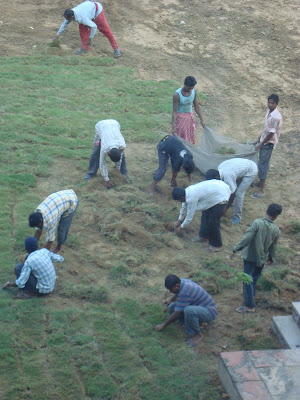Today I had the best auto ride of my life. It's never going to happen again. But, I know the majority of my nearly one dozen frequent viewers cannot begin to understand what I mean by "auto ride." Sure, you can look it up in the dictionary, read books and articles describing the experience, but it truly takes the bumpy, loud, bad tasting sensory explosion of a real life auto rickshaw ride to understand.
First, a few sweeping assumptions to help you understand a typical auto rickshaw driver. Auto drivers are interested in only one thing: getting as many Rupees out of you as possible. Most know some English - enough to discuss money, directions, and to argue about the fairness of a price. It is very easy for me to get an empty auto, one look at my skin complexion and a driver will ignore and drive around several waiting Indians to get to me.
All auto drivers, like the 99.9% of shop owners, are men. If I ever saw a woman auto driver I would run away because she would have to be the meanest, loudest woman I have ever encountered.
All auto rickshaws have meters in New Delhi, but it is a diamond in the rough finding one that not only works, but has a driver that agrees to use it. Some drivers break their meters and others are out dated. The ideal situation for them would be for you to ask to go somewhere, hop in, and go. This way they can ask for anything when you arrive and there is no way you can argue because the meter isn't working - you have no case. Instead, one must negotiate a price before stepping into the three-wheeler. If they do not drive away in disgust after you name where you want to go and then continue to stay after you name the price that you would like to pay, then you begin the age-old debate for a price on which both parties can agree.
With a population over 1 billion it is safe to assume that their are about three auto rickshaws per capita in Delhi.

Since this is such a great consumer's market, I find it all right to be picky. I will go through up to 10 autos before I am too worn out with arguing and settle for a slightly unreasonable price.
I usually take an auto twice a day - going to and coming from the ICGEB. By meter the price of a ride is 35 Rs. The ICGEB's location is in the middle of nowhere. This bittersweet arrangement means that a savvy driver is not going to take me to the ICGEB for 35 - he will want enough to pay for a trip to the nearest market for a new fare. Also, most auto drivers have been conditioned to expect more money from foreigners. Many a driver would rather transport an Indian for 50 Rs. than a foreigner for 70. So, in the morning I pay 50 Rs. to go to work. In the evening I try not to pay more than 40 Rs. since the place I live is very busy and full of customers.
I say to myself that no auto ride is complete until your seat has left the seat. Roads in Delhi are worn and pot-holey. Also, random speed bumps are put in everywhere to slow people down. There hardly any rules and no enforcement when it comes to driving, so the best enforcement is to take away the surface on which people speed.
The interior of an auto can vary widely. I have sat on all sorts of upholstery surfaces, from spotlessly new to foam poking out of slashed holes. The passenger seat can comfortable fit two, squish in three, and someone is in your lap with four. I have seen up to six people in an auto in addition to the driver, but one was a child. Past three, many a man will sit on the sliver of space next to the driver.

Now that you know a bit about the Indian taxi, let me tell you about my crazy sweet drive to work today:
I had a wad of 10 Rs.s in my pocket so that I was prepared for any price and price variation thrown my way. I walked out to the main road and waited for an empty auto to drive by. An auto pulled up, dropped off his previous fare and came up to me.
"Aruna Asaf Ali Marg"
"?" (i get this a lot)
"Go down Africa Ave." *wild gesturing in the general southery direction*
"Ah! Ber Sarai." now, many drivers know of Ber Sarai, it is a local market area. the problem i most often run into is that they don't want to go past Ber Sarai because they know that there is nothing out there except for fare-less science institutes. So I say, with limited success:
"South of Ber Sarai, 2 km south. Du kilometer SOUTH"
he understood the first time I said it, then he head gestured for me to get in the back.
I held up 4 fingers. "40 Rs."
He, without outrage or confusion, gestured again to get in the back.
I hopped in and noticed how clean and new the interior was. He didn't have stickers of Hindu gods all over the top part of his windshield. There was no rust where the yellow top met the green bottom of the cab. The seat and floor were clean and in a whole piece. The rickshaw sped down the street at a comperitively fast 40 kph; most autos top out at 30. He went past Ber Sarai without a glance and continued to the ICGEB until I asked him to take a right - which he did!
When we stopped, I pulled out 40 Rs, and walked away. He took the money and left without being upset or confused about how he's getting cheated. It is a rare morning if I have not argued with anyone about anything - and those mornings are because Vahid is there to negotiate a ride. My only regret is that I did not ask him to come back to pick me up every day for the rest of the summer.
So, that's an ideal auto ride. I hope that all of you can someday experience their majesty.


 On Friday I went to the Hard Rock Cafe. again. Vahid loves that place so much. especially the smokers room.
On Friday I went to the Hard Rock Cafe. again. Vahid loves that place so much. especially the smokers room. On Saturday I felt a compelling urge to go shopping. I had a lovely conversation with some Kashmeri salesmen. I bought their wares. Now I have to figure out how I'm going drag home two handmade silk Indian carpets. The woes I face in this country...
On Saturday I felt a compelling urge to go shopping. I had a lovely conversation with some Kashmeri salesmen. I bought their wares. Now I have to figure out how I'm going drag home two handmade silk Indian carpets. The woes I face in this country... Nora, I wish you read this blog because our dorm room is going to rule.
Nora, I wish you read this blog because our dorm room is going to rule.







 We headed back last night via overnight bus. At last I returned to the ICGEB for a day of science.
We headed back last night via overnight bus. At last I returned to the ICGEB for a day of science. 



